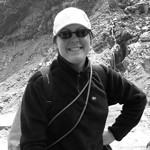One cool evening, just as the unusually warm autumnal days started to give way to the brief, dark days of winter, I flew in to Stockholm to start my six-week student exchange in Sweden.
The exchange is a program jointly organised by the Centre for Cultural Research at the University of Western Sydney and the Advanced Cultural Institute of Sweden (ACSIS) at Linköping University. It enables postgraduate students from both institutions to visit for between six and eight weeks. The first student on the program was PhD candidate Glen Fuller who visited ACSIS in 2004. In 2005, Helene Egeland came to Sydney and spent four weeks at the CCR. I was the third postgraduate student on the exchange program.
This was my first trip to Scandinavia. When I arrived I made my way to a suburb called Asspudden, just on the fringes of what is considered Stockholm’s inner city. There, I met with Helene Egeland who had generously offered me the use of her apartment for my stay. I grew very attached to Asspudden; its convenience to Stockholm, the little corner stores just outside the Metro stop and surrounding parks and walks along the waterways of Stockholm’s spectacular Lake Mälaren.
My weekly schedule involved visiting ACSIS on Mondays, Tuesdays and Wednesdays and then spending the rest of the week and weekend in Stockholm conducting research and seeing some of the sights of Stockholm.
ACSIS is located about an hour by train south of Stockholm at the Norrköping campus of Linköping University. Norrköping is a post-industrial museum town that boasts a “complete well-preserved industrial landscape” according to a local tourist map. The Museum of Work is one of the town’s most famous preserved buildings and is commonly known as “the flat iron” for its triangular iron-like shape. Also fully surrounded by water, this unusual building housed the offices of ACSIS.
Like CCR, ACSIS is a busy centre for interdisciplinary cultural research with activities that include seminars, research projects, conferences, doctoral courses, publications and visiting fellows. My stay coincided with the visits of three Post-doctoral students; Aagje Swinnen, who completed her PhD at Gent University in Belgium, Claudia Leeb who holds a PhD in science studies/psychology from the University of Vienna and is presently studying her second doctoral degree in political philosophy at the New School for Social Research, NYC, USA and Evi Mascha from the Department of Government at the University of Essex.
In my first week at ACSIS, I gave a presentation to the ACSIS staff and students on my research project and covered some of the challenges that cultural studies faces in Australia. At this meeting I met most staff and students and found out about their current research projects. I also attended two seminars held by ACSIS, introducing the work of the visiting Post-doctoral students and the art of Esther Shalev-gerz, an Israeli artist currently based in Paris.
During one of the ACSIS seminars I met Dr Michal Anne Moskow, Docent
Head of English & Intercultural Studies at Högskolan Trollhättan-Uddevalla, Sweden. She invited me to give a presentation at her University in the south of Sweden. I was also invited to meet and talk with some of the students in the Computer Informatics Department of Linköping University. I received excellent feedback and encouragement and returned with my arms full of doctoral theses recently completed by students in the department relevant to my project.
To further my work on the cultural history of the modern office, I conducted research at the Stockholm Business History Centre (Föreningen Stockholms Företagsminnen). The archives of the centre contain a vast set of documents, files and media belonging to Ericsson dating back to the late nineteenth century when the company was first founded. These files have come to be known as The Ericsson Files. While at the centre I focused on Ericsson’s promotional material and examined images and text, and the narrative themes that manifested. From this I was able to analyse how technologies were discursively systematized over time helping to constitute not just individual technologies but their application and place within a large network of humans, artefacts and the built environment. This research enabled me to collect unique data for my PhD and the process of filtering and channelling helped me to refine the direction of my research as a whole.
One of my original goals of the exchange was to interview staff in Ericsson on how the company envisioned the role of the mobile phone in future work practices. While in Sweden, I was able to secure an interview with one of the senior researchers of the Ericsson Consumer Lab based in Malmö in the south of Sweden. On my way to Malmö, I delivered my paper to Högskolan Trollhättan-Uddevalla and again received very constructive feedback.
This exchange is a tremendously worthwhile program because of the social and intellectual value of exposing students to new experiences, ideas and academic practices, and the benefit of building intellectual communities, networks and new friendships as part of that experience. I was very grateful to all those who provided me with assistance, friendship and encouragement, in particular the Director of ACSIS, Johan Fornäs and Administrator, Helene Egeland. It was an extremely valuable and enjoyable experience all round. I am also thankful that I received my own office, Internet and library access for the duration of my stay because all of these resources helped me to make my relatively short time in Sweden as productive as possible.
Subscribe to:
Post Comments (Atom)

No comments:
Post a Comment